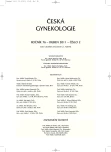Decreased fertility and today’s possibility of examination in reproductive immunology
Authors:
Z. Ulčová-Gallová
Authors‘ workplace:
Gynekologicko-porodnická klinika LF UK a FN Plzeň, přednosta doc. MUDr. Z. Novotný, CSc.
Published in:
Ceska Gynekol 2011; 76(2): 88-90
Overview
The aim of reproductive immunology is to look for a futher cause of decreased fertility, immunological reason, which depends on neuro-endocrine relationships. The article explains today’s possibility of examination of cell and humoral immunity with regard to human fertility.
Setting:
Department of Gynecology & Obsterics Charels University and Faculty Hospital, Pilsen.
Key words:
decreased infertility, reproductive immunology, laboratory methods.
Sources
1. Dimitrov, DG., Urbánek, V., Zvěřina, J., et al. Correlation of asthenozoospermia with increased antisperm cell-mediated immunity in men from infertile couples. J Reprod Immunol, 1994, 27, p. 3-12.
2. Drahošová, M., Madar, J., Janatková, I., Jančovičová, K. Diagnostic infertility – immunological laboratory markers. J Reprod Immunol, 2009, 81, 2, p. 168-169.
3. Fialová, L., Kalousová, M., Soukupová, J., et al. Markers of inflammation in preeclampsia. Prague Med Rep, 2004, 105, p. 301-310.
4. Gilman-Sachs, A., DuChateau, BK., Aslakson, CJ., et al. Natural killer (NK) cell subsets and NK cell cytotoxicity in women with histories of recurrent spontaneous abortions. Am J Reprod Immunol, 1999, 41, p. 99-105.
5. Kwak-Kim, JY., Chung-Bang, HS., Ng, SC., et al. Increased T helper 1 cytokine responses by circulating T cells are present in women with recurrent pregnancy losses and in infertile women with multiple implantation failures after IVF. Hum Reprod, 2003, 18, p. 767-773.
6. Kwak-Kim, J., Yang, KM., Gilman-Sachs, A. Recurrent pregnancy loss: a disease of inflammation and coagulation. J Obstet Gynaecol Res, 2009, 35, p. 609-622.
7. Kwak-Kim, J., Gilman-Sachs, A. Clinical implication of natural killer cells and reproduction. Am J Reprod Immunol, 2008, 59, p. 388-400.
8. Ledée-Bataille, N. – ústní podání, XI th International congress of reproductive immunology, Palm Cove, Queensland, Australia, August 15-19, 2010.
9. Madar, J., Urbánek, V., Chaloupková, A., et al. Úloha protilátkové a buněčné autoimunity proti spermiím v patogenezi mužské neplodnosti. Čes Gynek, 2002, 67, s. 3-7.
10. Madar, J., Pěknicová, J., Šůla, K., et al. Anti-trophoblast and anti cardiolipin imunity in repeated miscarriages – diagnosis and treatment. J Reprod Immunol, 2003, 58, p. 179-183.
11. Madar, J., Nouza, K., Nováková, D. Imunologické aspekty habituálního potrácení. Mod Gynek Porod, 2002, 11, s. 621-627.
12. Mardesic, T., Ulcova-Gallova, Z., Huttelova, R., et al. The influence of different types of antibodies on in vitro fertilization results. Am J Reprod Immunol, 2000, 43, p. 1-5.
13. Meroni, PL., Gerosa, M., Raschi, E., et al. Updating on the pathogenic mechanisms 5 of the antiphospholipid antibodies-associated pregnancy loss. Clin Rev Allergy Immunol, 2008, 34, p. 332-337.
14. Mettler, L., Bachmann, J., Schmutzler, A. High prevalence of markers for immunological disorders in IVF patients. Int J Gynaecol Obstet, 2004, 86, p. 59-60.
15. Peknicova, J., Chladek, D., Hozak, P. Monoclonal antibodies against sperm intra-acrosomal antigens as markers for male infertility diagnostics and estimation of spermatogenesis. Am J Reprod Immunol, 2005, 53, p. 42-49.
16. Pribylova, P., Malickova, K. Peripheral blood natural killer cell assay in infertile women. Prague Med Reprod, 2008, 108, p. 298‑304.
17. Purvis, MT., Kaider, BD., Roussev, RG., Coulam, CB. Antinuclear antibody prevalence in patients with reproductive failure. Am J Reprod Immunol, 1996, 35, p. 463-468.
18. Stagnaro-Green, A., Roman, SH., Cabin, RH., et al. Detection of at-risk pregnancy by means of highly sensitive assays for thyroid antibodies. JAMA, 1990, 264, p. 1422-1425.
19. Subrt, I., Ulcova-Gallova, Z., Bibkova, K., et al. Recurrent pregnancy loss and frequency of eight antiphospholipid antibodies and genetic thrombophilic factors in Czech women. Am J Reprod Immunol, 2008, 59, p. 193-200.
20. Suchá, R., Ulcová-Gallová, Z. Follicular fluid and its properties. Čes Gynek, 2000, 65, s. 181-188.
21. Szekeres-Bartho, J. Regulation of NK cell cytotoxicity during pregnancy. Reprod Biomed Online, 2008, 16, p. 211-217.
22. Ulcová-Gallová, Z., Bouse, V., Krizanovská, K., et al. Beta 2-glycoprotein I is a good indicator of certain adverse pregnancy conditions. Int J Fertil Womens Med, 2001, 46, p. 304-308.
23. Ulcova-Gallova, Z., Krauz, V., Novakova, P., et al. Anti-phospholipid antibodies against phosphatidylinositol, and phosphatidylserine are more signifiant in reproductive failure than antibodies against cardiolipin only. Am J Reprod Immunol, 2005, 54, p. 112-117.
24. Ulcova-Gallova, Z., Mukensnabl, P., Hadravska, S., et al. Antibodies against annexin V and prothrombin, their correlation with other anti-phospholipid antibodies in recurrent pregnancy loss. J Reprod Contraception 2005, 16, p. 35-46.
25. Ulcova-Gallova, Z. Antiphospholipid antibodies and reproductive failure. Chem Immunol Allergy, 2005, 88, p. 139‑149.
26. Ulcová-Gallová, Z. Neplodnost – útok imunity. Grada, 2006, s. 1-144.
27. Vanciková, Z., Chlumecký, V., Sokol, D., et al. The serologic screening for celiac disease in the general population (blood donors) and in some high-risk groups of adults (patients with autoimmune diseases, osteoporosis and infertility) in the Czech republic. Folia Microbiol (Praha), 2002, 47, p. 753-758.
29. World Health Organization. Laboratory manual for estimation of human semen and semen cervical mucus interaction. 3 ed. Cambridge: University Press, 1999, p. 1-139.
30. Winger, EE. CD57+ cells and recurrent spontaneous abortion. Am J Reprod Immunol, 2007, 58, p. 311-314.
Labels
Paediatric gynaecology Gynaecology and obstetrics Reproduction medicineArticle was published in
Czech Gynaecology

2011 Issue 2
Most read in this issue
- Extended embryo culture in IVF does not improve pregnancy rate
- Uterine fibroids and their treatment
- Luteal support in the IVF/ET programme
- Decreased fertility and today’s possibility of examination in reproductive immunology
